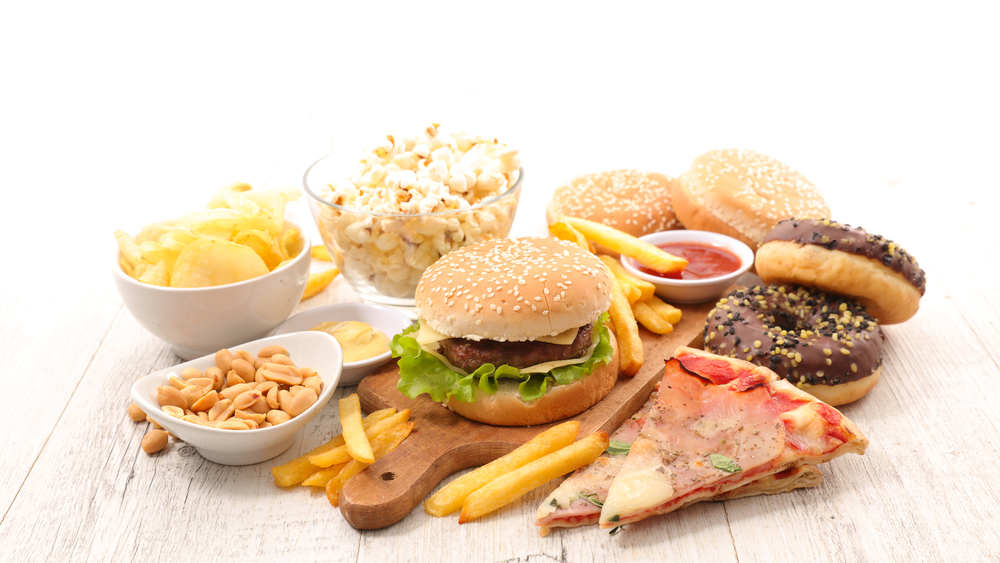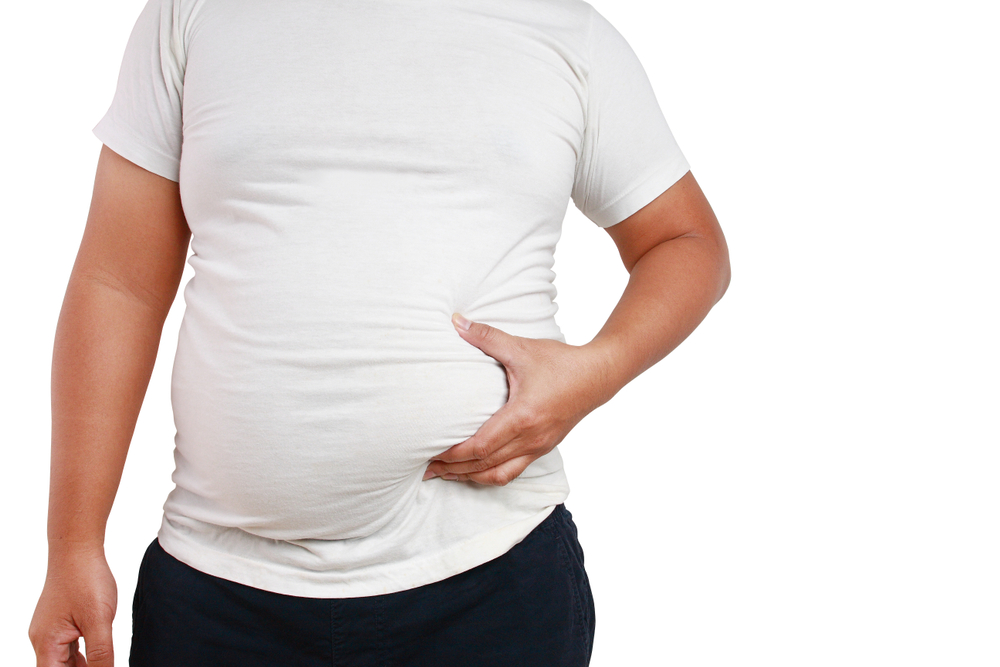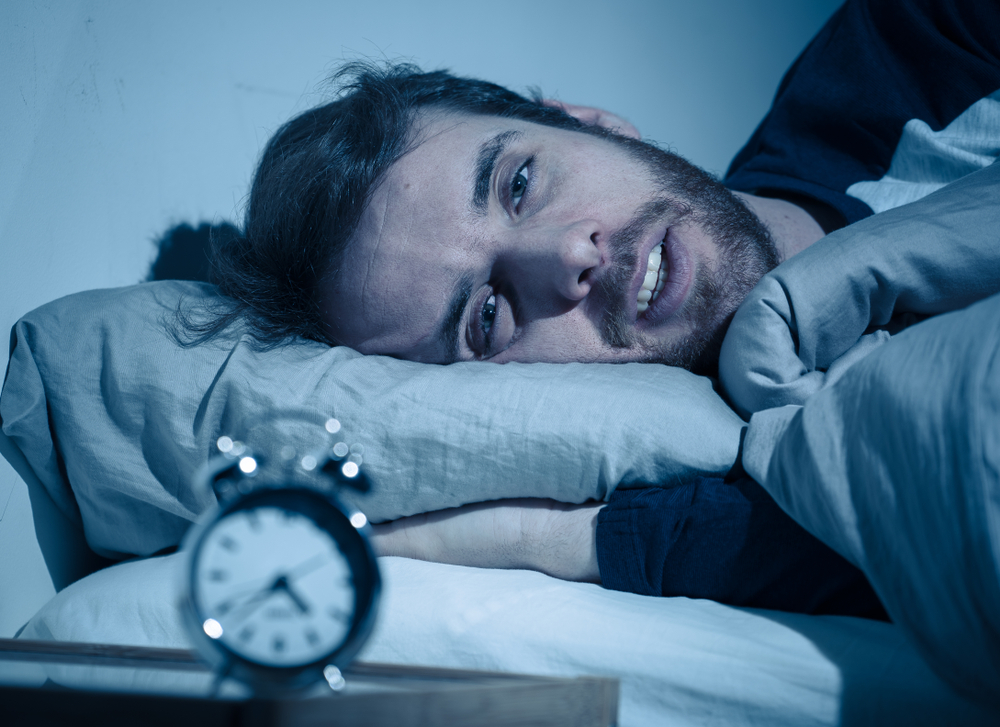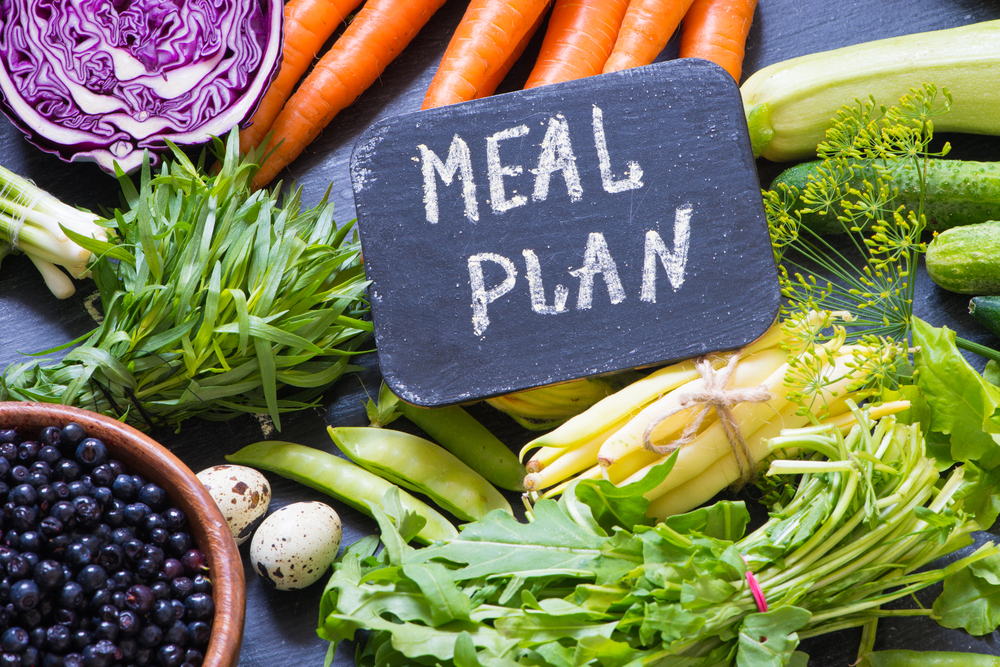We’re all human. We all get urges to eat what we’re not “supposed” to.
So, what do you do when junk food cravings strike full force? How do you fight the urge? Today’s article focuses on – what can feel like – the impossible: how to stop eating junk food.
Why you can’t stop eating junk food
Let’s start by addressing the problem. You already know that junk food is unhealthy. You know that it can cause weight gain, cholesterol problems, and a range of other health conditions.
But despite those reasons, you’re still unable to beat your junk food cravings. You feel like you can’t stop eating junk food, even though your rational side is telling you not to.
If you’ve noticed you can’t stop eating junk food, it’s likely down to your dopamine.

How junk food manufacturers know how to “hit the bliss point”
Dopamine is a motivation hormone, and it uses rewards to encourage your brain to repeat a certain activity or behaviour.
Say, for example, you’ve spent an hour working out at the gym, your brain would be rushed with dopamine. That dopamine – well recognised as a post-workout high – is used to encourage and motivate us to go back to the gym the next day and do it all over again.
Dopamine works on an “action equal reward” basis, motivating us to repeat said action.
Why Junk Food Cravings Exist
How does this dopamine hit relate to junk food? Well, junk food manufacturers understand the power of dopamine hits.
They’ve crafted a perfect combination of salt, saturated fats, sugar, and artificial flavourings. The result? Hacking your dopamine to create a “bliss point.” This bliss point is addictive and tells your brain that eating junk food should be repeated.
So, if you can’t stop eating junk food, it’s often down to fighting your hormones: a task far harder to conquer than battling rationality.
But it’s not impossible. When you’re armed with the knowledge of how to stop eating junk food, a range of strategies to beat your junk food cravings, and the willpower to keep it up, you’ll be able to stop eating junk food and embrace healthier alternatives.
What happens when you eat junk food?
Now that you understand what’s got you hooked on junk food, let’s take a look at why junk food is so bad for you. Is it really as bad as people say?
The term “junk food” really is descriptive of what it is: junk.
Low in nutrients, high in saturated fat, and extortionate levels of added sugar and salt: junk food is no picnic for your body.
With 7% of people in the UK eating junk food every day, the health consequences are dire.
Consequence of junk food 1: weight gain
One of the most well-known consequences of eating junk food regularly is significant weight gain. From 2021 to 2022, child obesity in the UK increased by 50%.
It’s no surprise that junk food causes weight gain. The NHS even position “eating large amounts of processed or fast food” as one of the core reasons for suffering from obesity.
This year, a study – published in Cell Metabolism – took place. The researchers from The National Institutes of Health aimed to discover just how much weight you can gain from eating junk food alone and why.
The study – in a nutshell – proved that eating processed foods results in 20% more calories than eating healthier alternatives. Those calories cause weight gain.
The study also demonstrates that we soak up more of the calories in highly processed foods due to a lack of insoluble fibre.

Consequence of junk food 2: heart disease
Weight gain is not the only consequence of eating junk food regularly. This side effect of a highly processed diet should make learning how to stop eating junk food a priority on your list.
Many nutritional experts and clinicians will often link eating junk food regularly to premature heart disease. This is because of the high levels of saturated fats that lead to weight gain and obesity, which puts a lot of pressure on your heart.
Hyperlipidaemia (ie: high cholesterol) along with high blood pressure are direct symptoms of heart disease, which can be caused by eating junk food too often.
It’s been proven, too, that there have been greater numbers of heart attacks in areas that house more fast-food restaurants.
Consequence of junk food 3: diabetes
Can junk food cause diabetes? The short answer is “yes.”
Junk food encourages insulin resistance in the body, meaning that junk food can absolutely cause diabetes.
High in trans and saturated fats, junk food can raise triglycerides (a type of fat in your blood), which increases the possibility of developing type 2 diabetes.
Consequence of junk food 4: dehydration
Have you noticed that, whenever you grab a burger and fries, you’re super thirsty afterwards? This isn’t a coincidence.
Junk food is dripping in salt, which causes dehydration. Not only is the excess salt bad for your heart, it causes an electrolyte imbalance, which results in bloating and discomfort.
Don’t reach for that fizzy drink, though. Fizzy drinks also dehydrate you. So, make sure you’re staying hydrated by drinking plenty of water.
Consequence of junk food 5: anxiety
It’s not only the physical risks of eating too much junk food that are problematic. Junk food can affect your mental health, too.
When you digest junk food, refined carbohydrates cause havoc on your blood sugar levels. If you suffer from anxiety and panic attacks, you’ll likely find junk food make these worse.
When junk food causes your anxiety to spiral, you may find that you struggle to fall asleep, too.

Consequence of junk food 6: depression
When you crave junk food, it may feel like your meal of a pizza or a burger satisfies you for a short moment. But this satisfaction is short-lived.
The Guardian published an article in 2018 that proved people who ate a considerable amount of fast food were far more likely to develop depression than people who sought healthy food.
How to stop eating junk food
It’s evident that eating junk food has devastating consequences. So, how do you stop eating junk food and, instead, opt for healthy foods? Here’s a step-by-step list of how you can break the cycle and stop eating junk food.
Step 1 to healthy eating: identify your motivation
When we’re making a change to our lifestyle – whether that’s to get in better shape, improve our mental health, quit smoking, or any other change to routine – we need to identify our reason for making the change.
This motivation should be clear for you, as it’s what will keep you going when you get those junk food cravings that you’re struggling to shake.
Motivations could include wanting to lose weight for a big event, being an example to your children, or improving your mental health.
Whatever it is, make sure you have identified it before you tackle the mission of bidding junk food goodbye.
Step 2 to healthy eating: don’t go cold turkey
As with any drastic change, if you eat junk food regularly, cutting it out of your diet overnight isn’t advised.
In 2018, a study was published in Appetite Science Journal which suggested that quitting junk food can actually cause withdrawal symptoms that are similar to when you quit smoking (or quit any other addictive substances.)
Going “cold turkey” when you’re quitting junk food may result in mood swings, irritability, exhaustion, and headaches.
So, eat junk food in moderation, reducing the frequency you eat junk food over time.
Step 3 to healthy eating: create a meal plan with whole foods
Your food choices will play a huge role in giving up junk food. While we’re not aiming to give up junk food overnight (as per our previous step,) you’ll need to focus on eating extremely well for the days where you continue eating junk food, so you can compensate for that.
Whole foods are a key way to do this. Whole foods are foods that aren’t processed. Essentially, they’re foods that haven’t had fat, salt, and sugar added to them, as well as key nutrients like fibre haven’t been removed.
Examples of a whole food diet include whole grains, vegetables, fruits, nuts, and seeds. Unprocessed meats like chicken and beef can also be considered whole foods, too.
While meal planning may seem like an inconvenience, it will encourage you to really think about the nutritional value of each meal. Leaving it until 6 PM on a Monday evening is often the most turbulent time for battling your junk food cravings.
That said, if you consistently plan your meals on a Sunday for the week, you’re able to spend the time you need deliberating the best choices for you (and your family) throughout the working week.

Step 4 to healthy eating: practice mindful and intuitive eating
Mindful eating and intuitive eating are two tactics used by people who aim to battle unhealthy habits and improve their overall health through nutrition.
Mindful eating is all about being present while eating without any judgment. It goes against ignoring signs of hunger in order to lose weight.
Instead, mindful eating is about being aware of your body’s cues that you need to eat, as well as leveraging all of your senses in the eating experience.
Mindful eating encourages a relationship between you and your body while eating, developing trust in yourself to know when to stop.
Intuitive eating asks you to train your brain into combatting your junk food cravings with the question “what does my body need?” rather than “what do I want?”
Intuitive eating also extends to self-care, satisfaction, and pleasure.
Step 5 to healthy eating: stock up on nutritious foods
The most difficult time to resist a junk food craving is when your cupboards and fridge are bare.
With food delivery apps just a tap away, it can be extremely difficult to find the motivation to head to the shop, purchase whole foods, head home, and then prep and cook them (not to mention the washing up.)
That’s why stocking your cupboards and fridge with healthy snacks and healthy alternatives will encourage your positive eating habits to be more sustainable.
Poor food choices are – a lot of the time – down to convenience as much as food cravings.
We recommend stocking up on fresh fruit, brown rice and pasta, and whole foods.
Step 6 to healthy eating: drink plenty of water
Whenever you find you’re struggling to kick the junk food habit and you’re craving a burger, fries, pizza, or kebab, drink water.
Drinking water will both hydrate you and stop your junk food cravings, as you’re diverting the desire for ultra-processed foods.
This trains your brain over time and will lessen the number of cravings you’re experiencing.

Step 7 to healthy eating: increase your protein intake
When you’re ridding your body of junk foods, focus on your protein intake.
Protein makes you feel full and satisfied – more so than carbohydrates.
Rather than giving in to unhealthy food cravings, boost your protein intake with foods like:
- Fish
- White meat (especially turkey and chicken breast)
- Vegetables
- Beans
- Nuts.
If you’re full, the chances of craving junk food are far lower.
Step 8 to healthy eating: go for a walk
Distraction works! Going for a walk and getting outside helps reset your mind.
In 2015, a study that monitored 48 people discovered that taking a 15-minute walk helped to reduce cravings for sugar-fuelled, high-calorie snacks.
Plus, you’ll get those steps in, too. Win, win!
Tips for avoiding junk food temptation
Temptation is often the hardest thing to beat. So, how do you stop being tempted to eat junk food? Here are a few ways to avoid the temptation of choosing unhealthy foods.
Keep junk food out of sight
The term “out of sight, out of mind” really is accurate, especially under these conditions.
However, we’re all human. If you knew where your unhealthy snacks are, you’d be tempted to eat them. That doesn’t make you weak. It makes you human.
So, to avoid this, ask a family member or friend to hide your junk food somewhere you won’t look. Not knowing where your unhealthy snacks are disposes of one core temptation that could result in poor food choices.
Take your time when savouring your food
When eating, chew purposefully. This may sound a little uncomfortable, but give it a shot.
The founder of UnReal Candy, Adam Melonas, stated: “if you can make people chew more, they’ll eat less.” UnReal Candy aims to take the “junk” out of sweet snacks. This principle can be applied to every meal. So, chew more than you feel you need to, and slow down. Finish your bite entirely before you take the next.
Seeking professional help for a food addiction
Quitting junk food can be an extremely tricky task, which is often a journey of ebbs and flows rather than a straight line.
That said if you feel your reliance on junk food is too great to manage on your own, don’t rely on your willpower to get you through, as you will need external help.
If you display these symptoms, please seek professional help:
- Being unable to stop eating particular food despite not being hungry
- Eating so much that you feel unwell or you’re vomiting
- Going to extremes to get junk food when it’s not easily available to you
- Finding you’re neglecting family, friends, work, and hobbies due to excessive eating
- Spotting that eating is reducing negative emotions and headspaces (such as lessening anxiety attacks)
- Being dishonest to others about your eating habits
- Feeling guilty after overeating
- Believing that food is controlling your life.
Food addictions can also hinder your emotional well-being, so it’s crucial that – if you experience any of the symptoms on this list – you speak to a mental health professional.
Stop eating junk food: start making healthy choices
Giving up junk food will be one of the healthiest choices you’ll make this year.
With processed food rich in saturated fats, sodium, and excessive sugar, they “hack” your brain into believing that they provide happiness. In reality, they can cause devastating consequences and are only contributing to the declining obesity rates in the UK.
Focus on healthy living through planning balanced meals, making sure you get enough sleep, and generally working toward maintaining a healthy diet.
7% of people in the UK eat junk food every day – The
Child obesity in the UK has increased by 50% in the past year alone –
Eating large amounts of processed or fast food that’s high in fat and sugar contributes to the development of obesity –

Ultra-Processed diets cause excess calorie intake and weight gain: An inpatient randomized controlled trial of ad libitum food intake –

Clinicians recgonise that junk food consumption is associated with premature heart disease –
Increased rates of heart attacks in geographical areas that have more fast food restaurants –
Eating
Study Indicates That

Taking a 15-minute walk helps reduce cravings for sugary, high-calorie snacks – Acute

While we've ensured that everything you read on the Health Centre is medically reviewed and approved, information presented here is not intended to be a substitute for professional medical advice, diagnosis, or treatment. It should never be relied upon for specific medical advice. If you have any questions or concerns, please talk to your doctor.




